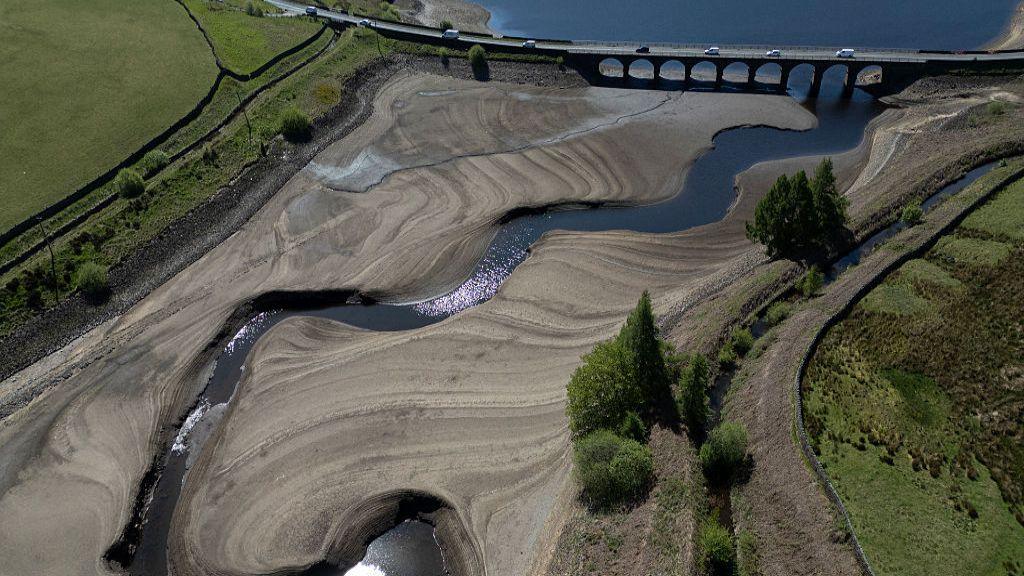River levels across the UK have reached critically low points, a trend the Centre for Ecology & Hydrology (CEH) predicts will worsen over the next three months. This raises significant concerns regarding water supplies for households, agriculture, and businesses.
This warning follows England’s driest spring since 1961, with northern regions experiencing their driest start to a year in almost a century.
Low or below-normal river levels are anticipated across most of the UK in May, excluding southwest England and southern Wales.
The Environment Agency has declared a medium drought risk for the UK and advised households to prepare for potential water restrictions.
Mark Owen, head of fisheries for the Angling Trust and a member of the National Drought Group, highlights the next 2-3 weeks as crucial in determining whether a formal drought declaration is necessary.
While not currently classified as a drought, the impact of the exceptionally dry weather is already evident.
Farmers are resorting to irrigating crops, a measure typically implemented later in the year.
“We are experiencing an agricultural drought,” stated arable farmer Nick Deane to BBC News from his Norfolk farm, where irrigation commenced in March.
He explained the necessity of water rationing to sustain crop growth.
He cautioned that a prolonged drought would severely impact food production, necessitating increased imports.
This year’s dry, sunny weather has resulted in a significantly larger wildfire-affected area compared to any previous year.
The last drought, in June-August 2022 (joint hottest summer with 2018, and fifth driest since the 1890s), saw five companies impose hosepipe bans affecting 19 million people, and restricted waterway navigation.
That drought followed six months of exceptionally dry weather.
However, the relatively wet summer of 2024 and moderately wet winter have improved water reserves, providing a buffer.
Nevertheless, the earlier dry spell poses a heightened risk to water resources, particularly if the dry conditions persist, cautions Stephen Turner, a hydrologist at the UK Centre for Ecology and Hydrology.
Richard Thompson, chair of the National Drought Group, recently warned of the potential need for water restrictions to safeguard supplies if the dry weather continues.
Currently, the key factors are the timing and volume of future rainfall.
Some signs of potential rain are emerging, with unsettled weather anticipated from the west by the end of next week.
Drinking water sources vary geographically and geologically.
Generally, southern England experiences slower drought onset and recovery due to groundwater storage, while the north sees quicker transitions due to greater reservoir reliance.
Water companies implement hosepipe bans when supplies reach critical levels.
Severe drought could lead to restrictions on farm irrigation, waterway navigation, and water allocation to non-essential businesses.
In extreme scenarios, household and business water rationing might become necessary, though this hasn’t occurred since 1976.
Water industry leaders and the National Farmers’ Union (NFU) urge the government to enhance water security in drier regions.
Water UK advocates for a national water grid to redistribute water from wetter to drier areas.
Farmers request increased government funding and reduced planning obstacles for reservoir construction.
Mr. Deane and five other farmers collaborated to build a reservoir, a four-year, £1m project, proving crucial this year, with 15% of stored water already utilized.
However, they highlight the challenges and costs associated with obtaining planning permission.
A government spokesperson confirmed collaboration with the agricultural sector to improve water resilience and support farmer-led reservoir projects, citing over £104bn in private sector investment for infrastructure, including nine new reservoirs.
The prolonged dry weather is linked to persistent high-pressure systems (“blocking highs”).
The connection between these patterns and climate change remains uncertain.
Global warming is anticipated to increase extreme weather events globally.
Climate projections suggest more frequent and prolonged dry periods, and reduced rainfall in the UK, alongside wetter and warmer winters.
This could exacerbate various drought types, including hydrological and agricultural droughts, according to the Met Office.
Graphic by Erwan Rivault
The 156th edition of the show starts at Balmoral Park later and is expected to attract big crowds.
Matt Baker, of Countryfile, will also attend the event, which is known for livestock competitions.
Nigel Friend raises concerns about the impact of the driest April on record for farming.
The research builds on the discovery that chimps seek out and eat certain plants to self-medicate.
The annual agricultural showpiece at the Eikon Centre near Lisburn starts on Wednesday.

